The PUV Service Contracting Program (SCP) is a government initiative established to provide cash subsidies to public utility vehicle (PUV) drivers impacted by the pandemic, all while maintaining the efficiency and safety of public transport services. Enacted under the Bayanihan to Recover As One Act, the SCP addresses the unprecedented challenges posed by the global health crisis, offering vital support to affected PUV operators and drivers.
Operating under the guidance of Republic Act No. 11494, the SCP offers various forms of assistance, including two main types of contracts, yet the core objective remains consistent: to ease the financial pressures on PUV operators and ensure the uninterrupted provision of essential transportation services. With collaborative efforts from all stakeholders, particularly the Land Transportation Franchising and Regulatory Board (LTFRB), the PUV SCP ensures the effective implementation of the program, reaching those most in need during these challenging times.
What is PUV SCP
The Public Utility Vehicle Service Contracting Program (PUV SCP) is a government initiative designed to provide cash subsidies to affected PUV drivers by contracting public transport services. Through these contracts, the SCP aims to ease financial pressures on PUV operators while maintaining essential transportation services during the pandemic.

The SCP, spearheaded by the Department of Transportation (DOTr) in collaboration with the LTFRB, the local government units (LGUs), and the Transport Service Entities (TSEs), was launched to address the pressing need for reliable and financially viable public transportation during the pandemic. Under the SCP, PUV drivers are compensated based on the kilometers traveled, irrespective of the number of passengers they carry. This unique approach incentivizes operators to prioritize service quality, receive feedback from commuters, and ensure optimal performance.
Types of Service Contracts
The SCP offers two main schemes:
- Net Contracting: Operators are paid per kilometer of completed trips and are allowed to collect fares from passengers.
- Gross Contracting or the “Libreng Sakay” Program: Operators are also paid per kilometer of completed trips but at a higher rate. This scheme operates as a Free Ride service, where no fares are collected from passengers.
Objectives of the PUV SCP
The SCP operates with the goal of achieving several key objectives:
- Financial Assistance
To provide financial support to transport service providers and personnel, offering a lifeline to those adversely affected by the pandemic.
- Efficient Public Transportation
To ensure that public transportation operations are carried out effectively, meeting the needs of commuters while adhering to safety protocols.
- Support for Frontline Workers
To maintain support for the mobility needs of frontline healthcare workers by providing free rides whenever feasible.
- Safe and Quality Public Transport Service
Maintain the quality and safety of public transportation services to meet the needs of passengers in the new normal.
Qualifications of Program Participants
As per the rules in the LTFRB Memorandum Circular No. 2023-048 and Republic Act No. 11639, also called the General Appropriations Act (GAA) of 2022, PUV SCP participants must meet these criteria before joining the program:
- Local Government Unit
- Must be an HUC, ICC, or CC; and
- Must have an existing intra-city route with consolidated entities as defined above.
- Transport Service Entity
- Must operate as an existing combined public jeepney (TPUJ, FILCAB, and MPUJ), UV Express (TUVE), or modernized UV Express (MUVE), or have applied for consolidation and received approval from the LTFRB.
- Must have at least ten combined units per operator per route, which can include traditional, modernized, or a mix of both types of vehicles.
- Must possess a valid Certificate of Public Convenience (CPC) or Provisional Authority (PA).
- Must have current registration with the Land Transportation Office (LTO) and Personal Passenger Accident Insurance (PPAI).
- Must have a functioning GPS device installed and accredited beforehand.
Responsibilities of Parties in the PUV SCP Implementation
LTFRB
- Sign a Service Contract Agreement (SCA) with LGU, TSE, and GPS provider.
- Coordinate with LGUs confirmed as co-implementers.
- Identify routes for the program.
- Select eligible TSEs for contracting.
- Provide a Service Plan for onboarded TSEs.
- Coordinate with relevant agencies and conduct meetings.
- Ensure timely payouts to contracted TSEs.
- Maintain a monitoring dashboard.
- Monitor SCP reports from relevant parties.
- Perform other necessary functions guided by DOTr and TWG.
LGU
- Sign an SCA with LTFRB, TSE, and GPS provider.
- Assign personnel for efficient program implementation.
- Monitor subject routes and implementation in coordination with LTFRB.
- Coordinate with LTFRB for TSE deployment.
- Submit required documents and reports to LTFRB.
- Provide rerouting plans if needed.
- Conduct stakeholder consultations.
TSE
- Attend orientation by LTFRB.
- Sign an SCA with LTFRB, LGU, and GPS provider.
- Provide necessary information to LTFRB.
- Manage drivers and other personnel’s salaries.
- Ensure drivers have valid licenses and units are registered.
- Maintain daily unit availability.
- Adhere to LTFRB policies.
- Communicate Service Plan details to drivers.
- Ensure compliance with passenger capacity.
- Maintain units’ condition.
- Acknowledge and respond to LTFRB emails.
- Provide daily passenger service reports.
- Submit Weekly Payout Certificate to LTFRB promptly.
Guidelines in Implementing PUV SCP (from DILG MC 2023-048)
Requirements
LGU Program Participant
- Letter of confirmation to participate in the Service Contracting Program
- Signed Service Contract Agreement with LTFRB, LGU, TSE, and GPS provider
TSE
- Three (3) Original Copies of Duly-Accomplished registration forms with lists of authorized units and drivers.
- Three (3) Photocopies of the Application for Consolidation received by LTFRB or three copies of valid Certificate of Public Convenience (CPC) or Provisional Authority (PA).
- Three (3) Photocopies of current OR/CR issued by the Land Transportation Office (LTO) for authorized units.
- Three (3) Photocopies of valid Personal Passenger Accident Insurance (PPAI).
- Three (3) Original Copies of Board Resolution/Secretary’s Certificate authorizing representatives to sign the SCA.
- Three (3) Photocopies of valid primary ID of Operator’s General Manager or Chairman/President with three original specimen signatures.
- Three (3) Original or Certified True Copy of the bank certificates, preferably from Land Bank of the Philippines (LBP), with account details.
- Three (3) Original Copies of certifications of GPS installation signed by the CEO/Director GPS.
Procedures
For Local Government Unit Program Participant:
Step 1. DILG will send a Circular to pre-selected LGUs for SCP participation.
Step 2. LGUs confirm participation by sending letters to LTFRB-RFRO for route and TSES assessment.
Step 3. LGUs are informed about route and TSE qualification for SCA execution after meeting requirements.
For Transport Service Entities:
Step 1. TSEs fill out and get approval for a TSE Assessment Form from LTFRB-RFRO.
Step 2. Approved TSEs submit original/true copies of required documents to LTFRB-RFRO.
Step 3. LTFRB/RFRO evaluates documents for auditing before TSE onboarding.
Step 4. Qualified TSEs receive onboarding orientation before LTFRB-RFRO sends notice.
Service Plan
LTFRB-RFRO develops Service Plan detailing routes, trip numbers, and deployed units, approved by Regional Directors.
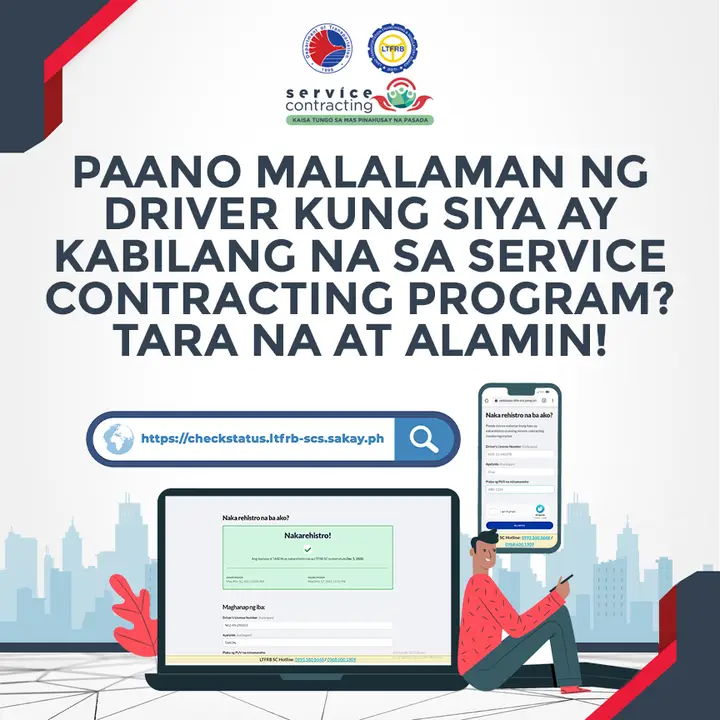
Important Reminders
For Minimum Deployment:
- At least 80% of authorized units must be deployed.
- Actual trips determined by kilometer-run but within prescribed limits.
- Minimum 10 PUVs per route per operator.
- Unauthorized trips won’t be paid.
- Excess kilometer-run per unit isn’t compensated.
Route Structure:
- Route changes allowed for road closure, re-routing, or similar reasons.
- Evidence needed to support route modification requests.
- New Service Plan issued for route modifications.
Physical Accomplishments
The SCP has made significant strides in supporting PUV operators and drivers, as well as commuters, across the country. The accomplishments of the DOTr under this program include:
- Provision of jobs for over 50,000 drivers and operators
- The use of different transport modes like buses, modern and traditional jeepneys, UV Express, and minibuses to serve 141.2 million passengers.
- It also supports the PUV Modernization Program, helping 71 transport cooperatives get 734 modern vehicles.
Here’s what some of the program beneficiaries, both the drivers and passengers, have to say about the PUV SCP implementation in various regions:
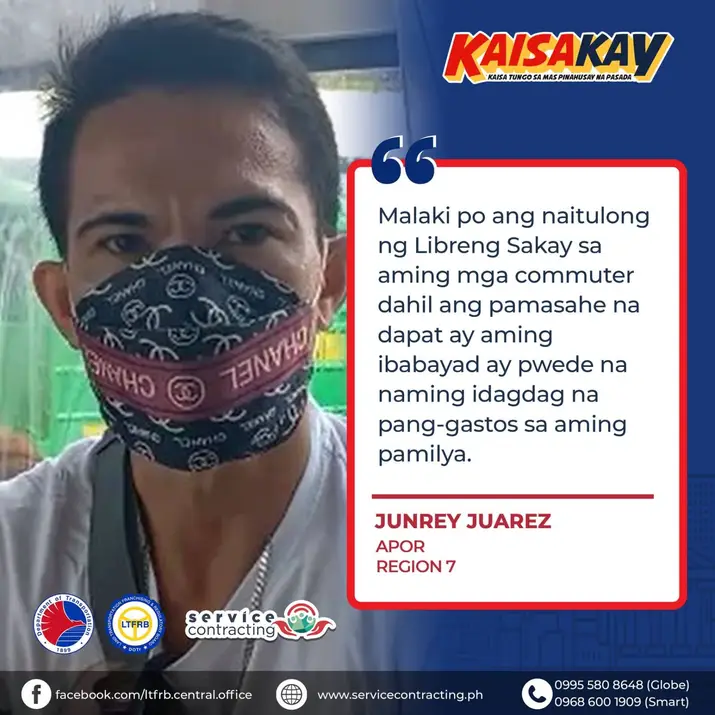
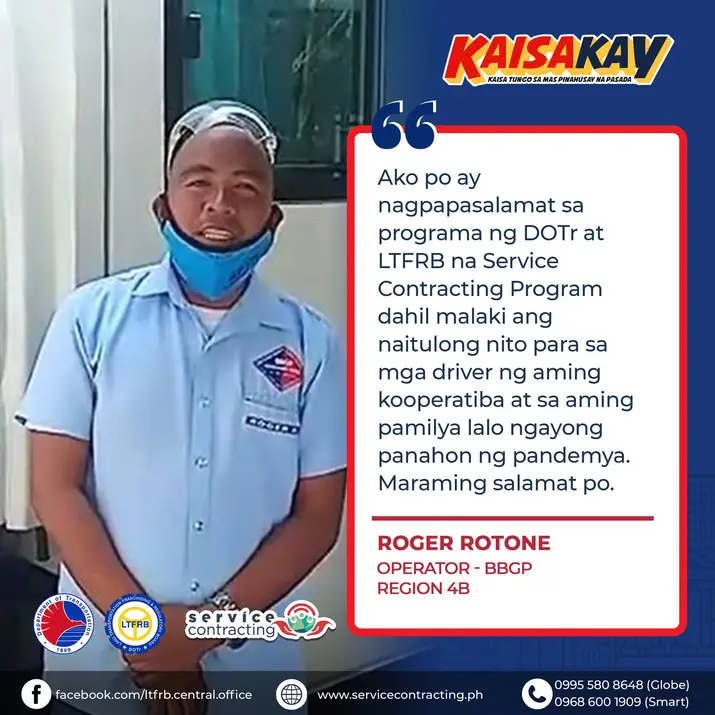
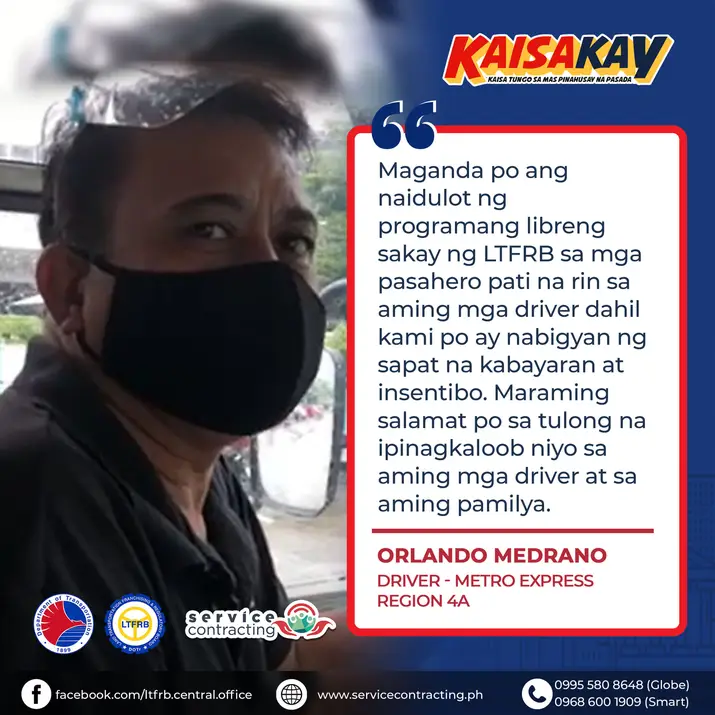
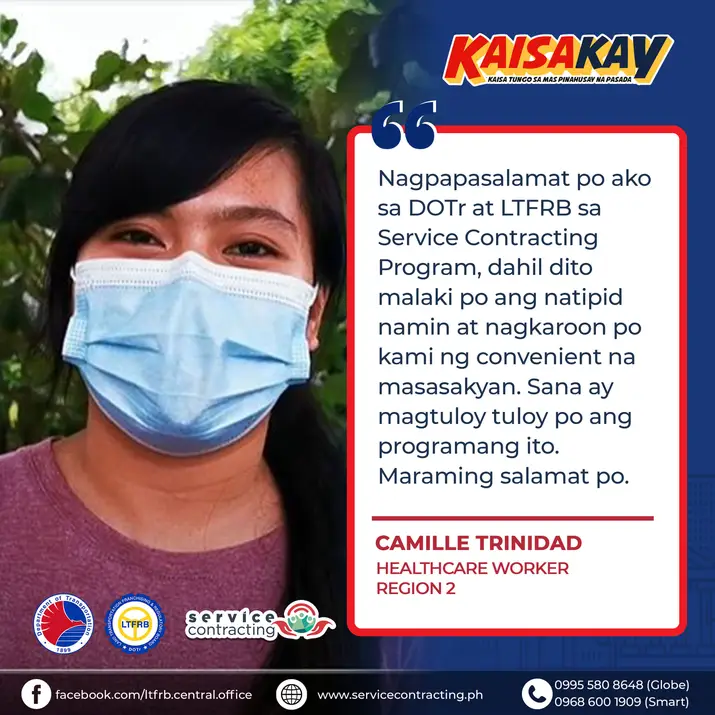
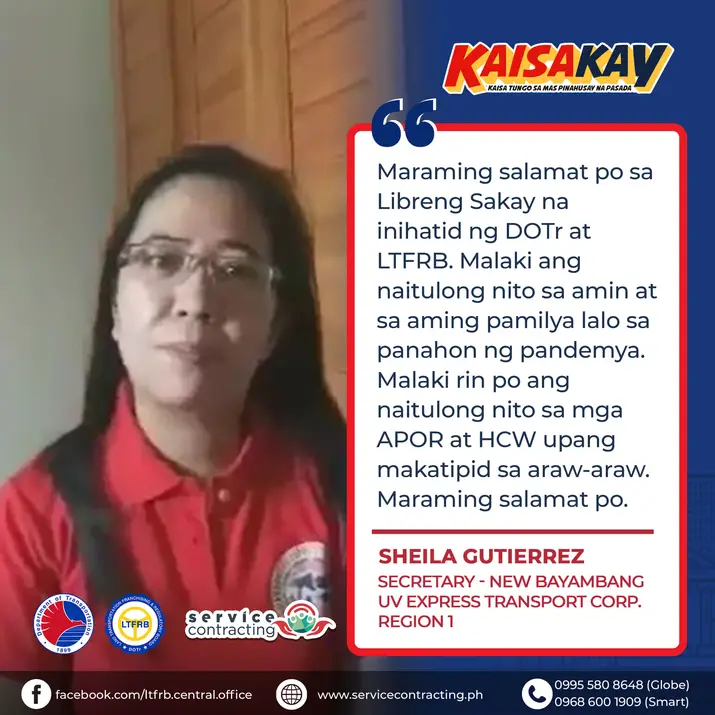
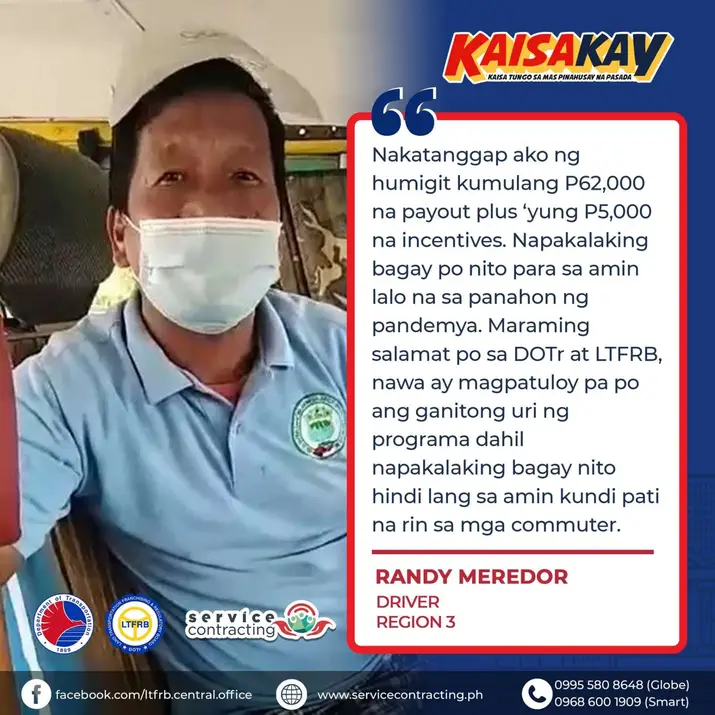
The Future of PUV SCP
As the SCP continues to evolve, it remains a vital component of the government’s efforts to mitigate the impact of the pandemic on the transportation sector. Through ongoing collaboration and adherence to established guidelines, the SCP provides the much-needed support to PUV operators and commuters alike.
Video: Challenges to SCP in the Philippines
Watch as experts from Switch-Asia Policy Support Component in the Philippines introduce the main current challenges towards the mainstreaming of SCP policies in the country.
Summary
The PUV SCP stands as a testament to the resilience and adaptability of the Filipino people in the face of adversity. By working together and embracing innovative solutions, we can overcome challenges and build a brighter future for all.
For inquiries, you may contact LTFRB via email or telephone:
Trunkline No: 8876-34-54
Email: piu@ltfrb.gov.ph
Telephone No. (02) 8529-7111 loc. 8032, 837